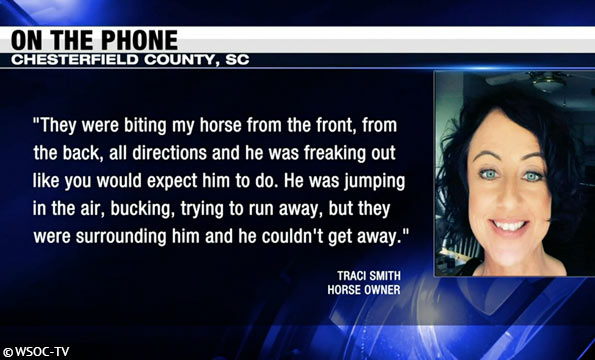Have Covid-19 Conditions Been a Contributing Factor?

Dubois, WY - By BLM Wyoming/Bob Wick, Attribution 2.0 Generic (CC BY 2.0)
Death by Dogs Confirmed
UPDATE 07/22/22: In mid-July, the Fremont County Coroner’s office released the cause of death of Shawna Jo Bell, a Northern Arapaho tribal member. Bell was found dead on April 10. The County Coroner’s Office had responded to an "animal bites" call that same night. Bell's cause of death was not made public originally. The official cause of Bell’s death was, “bites, lacerations, contusions, (and) avulsions due to dog attack.” The manner of death was ruled an accident.
County 10 reached out to Vikki Migoya, the Public Affairs Officer of the FBI Denver Field Office, and learned that only two dogs were involved. "As the incident occurred on federal land, the FBI was the primary investigating agency," Migoya said. "Investigation revealed that Ms. Bell was attacked by two domesticated dogs located at a residence. At least one of the dogs was involved in a previous attack. Those dogs have since been euthanized," Migoya said in a statement.
A proposed dog control ordinance for the Wind River Reservation was also submitted for review by the Wind River Inter-Tribal Council. Darrel Lonebear, a security supervisor of Northern Arapaho Housing, strongly supports the new ordinance. Lonebear said the draft has been approved by the Eastern Shoshone General Attorney, and now it must be approved by the intertribal council. The new ordinance includes fines and jail time for the owners of uncontrollable, wandering dogs.
05/29/22: Woman Found Dead
Ethete, WY - It was reported in mid-April that a death investigation was underway on the Wind River Reservation in Wyoming after a suspected fatal dog mauling. A media release from the Fremont County Sheriff’s Office said the County Coroner’s Office responded to an "animal bites" call on the night of April 10, after a woman was reported to have been found dead in the Ethete area. She was identified as 42-year-old Shawna Jo Bell, a Northern Arapaho tribal member.
Vikki Migoya, the Public Affairs Officer for the FBI Denver Field Office confirmed at that time, "I can confirm that 42-year-old Shawna Jo Bell was found dead April 10 in Ethete, Wyoming." Migoya added, "The coroner will determine the time, manner and cause of death." Fremont County’s chief deputy coroner Erin Ivie also stated at that time, "There is no public safety issue." Indicating that if one or more dogs did carry out the deadly attack, the animals had since been destroyed.
In the April 22 report by County 10, Ivie said that Bell had been autopsied and that more details would be released in 4 to 6 weeks, which is June 3.
The Wind River Indian Reservation is shared by two tribes, the Eastern Shoshone and the Northern Arapaho. The land area is about 3,438 square miles and constitutes over one-third of Fremont County. In 2014, Deanne Lynn Coando, an Eastern Shoshone tribal member, was killed by a pack of dogs in Riverton, also located in Fremont County. Her cause of death was ruled, "exsanguination due to multiple injuries from animal attack consistent with infliction by dogs."
Navajo Nation, Arizona & New Mexico
Bell's suspected dog mauling death marks the third dog bite fatality on Indian reservations this year, and a half dozen deaths since the onset of the pandemic. Last May, Lyssa Upshaw, 13-years old, was killed by a pack of vicious dogs in Fort Defiance on the Navajo Nation. Her death resulted in new legislation adopted by the Navajo Nation Council in 2022 that makes dog attacks a criminal nuisance, increases fines and prison sentences and orders restitution payments to victims.
§ 486. Criminal nuisance; Vicious dogs and other dangerous animalsThe punishment for each separate violation resulting in a conviction under §486(A)(3) shall be: (1) a term of imprisonment not less than 30 days and not more than 365 days: or (2) a fine not less than one-thousand-dollars ($1000) and not more than five-thousand-dollars ($5,000); or (3) the trial court may impose both punishments concurrently … Those convicted under §486(A)(3) shall pay restitution for any costs incurred by the victim(s) as a result of any physical or mental injury and/or death suffered … in the event of death of the victim., restitution for any and all costs incurred on behalf of the deceased, including but not limited to, funeral and burial expenses. This restitution payment shall not shield the person convicted from liability for civil fines under 13 N.N.C. §§ 1702-1715 or civil damages in any statutory or common-law civil action.
Upshaw is the 5th or 6th known fatal dog attack victim on the Nation since 2010. The new legislation contains "findings," which summarize how the pandemic hindered animal control efforts. Due to the pandemic, "enforcement of the Navajo Nation's animal control laws has been severely impeded since the Spring of 2020, with several NNACP facilities [animal shelters] closing. As well, the pandemic has reduced NNACP's efforts at spaying and neutering the dog population."
Both conditions resulted in an unprecedented number of dogs at large on the Navajo Nation. One month before Upshaw's death, Navajo Nation Animal Control manager Kevin Gleason estimated the dog population on the Nation was back up to 250,000 dogs, just like it was 10 years ago. In 2020, his program only picked up about 7,000 dogs, instead of the normal 20,000 to 30,000 dogs annually. Also, the veterinary mobile spay/neuter unit was not used during the pandemic.
It is unknown if the pandemic similarly affected other reservations that suffered a fatal dog mauling during the pandemic, including: the Meskwaki Nation in Iowa, the Northern Cheyenne Indian Reservation in Montana, Spirit Lake Reservation in North Dakota, and the Wind River Indian Reservation in Wyoming. Most of these Nations, however, had already been trying to strengthen dog attack laws before Covid, because of the rising nuisance and roaming dog populations.
Furthermore, a comprehensive white paper analysis published in January 2017 by the Navajo Nation Animal Control Program (NNACP), reported that "over the last five years there has been an increase in the severity of dog bites cases. The Animal Control Officers agree that the dogs are becoming more vicious and aggressive." At least on the Navajo Nation, not only was the roaming dog population rising pre-Covid, so were vicious and aggressive dog complaints and attacks.
Wind River Indian Reservation, Wyoming
After Bell's death, Darrel Lonebear, a security supervisor of Northern Arapaho Housing on Wind River, spoke to the Cowboy State Daily. "We want this ordinance done," he said. “People worked on this dog ordinance and it’s been put together in a great manner and fashion. Let’s make it part of a law and order code so it’s enforceable, that if people are going to keep these types of dogs around, and they do these things, (the owners) need to be punishable under the law.”
Lonebear has dealt with the loose and vicious dog problem for 22 years. His job is to prevent dog attacks within the NAT Housing community. Bell was found deceased outside of the tribal housing area. Lonebear said when he drove by the scene of Bell's death the morning afterward, "he saw a pit bull with a rope around its neck that appeared immobile or dead," reports the Cowboy State Daily. The photo headlining the article shows two at large, menacing pit bulls as well.
"If I get a vicious dog that’s attacking a child – and these pit bulls weigh 85, 90 pounds -- I’m going to do something about it, here in our housing community." - Darrel Lonebear, Cowboy State Daily, April 22, 2022
Wind River tribal officials developed a new ordinance in 2019 to address loose and vicious dogs through stronger penalties to dog owners. The new ordinance, however, has not yet become law. It must be approved by both Northern Arapaho and Eastern Shoshone councils. Without an ordinance banning vicious dogs and punishing irresponsible dog owners, the Wind River Police Department, which is bound to enforce federal and tribal laws, is limited to act, Lonebear said.
Northern Cheyenne Indian Reservation, Montana
Having such an ordinance, however, does not always guarantee enforcement. In December, after Duke Little Whirlwind, 58, was killed by dogs on the Northern Cheyenne Indian Reservation, issues came to light about the Bureau of Indian Affairs (BIA) refusing to enforce an ordinance passed by that tribal council in 2019. Because the tribe has no funds to administer an animal control program, the ordinance authorized BIA to "eliminate dangerous dogs from the reservation."
"WHEREAS, the Northern Cheyenne Indian Reservation is currently overpopulated with dogs, some of which roam uncontrolled and are dangerous ... WHEREAS, the Tribe currently does not have adequate funds to administer an animal control program; and WHEREAS, until funds are secured for such a program, the Tribal Council wishes to adopt an ordinance which authorizes law enforcement authorities (primarily BIA law enforcement) to eliminate dangerous dogs from the Reservation." - Ordinance No. DOI-014 (2019)
In that case, the BIA had initially asked for the ordinance as an opportunity to take care of the dangerous dog problem, then recanted and told council members they could not comply with the ordinance due to federal rules governing the use of their firearms. Tribal Council member Lane Spotted Elk said the BIA police chief told the council that any discharge of their service weapons would lead to an internal investigation by the agency and that officers did not want to undergo that.
Spotted Elk said the ordinance went unenforced until mid-2021. At that time the tribe invested in traps and hired personnel to capture the dogs to either take them to shelters or euthanize them. That process is quite slow, Spotted Elk told The Missoulian. Since trapping began, council said they had only been able to relocate about 30 animals. Given the total number of dogs on the reservation, attempting to control the dog population using this method appears futile at best.
The BIA is a United States federal law enforcement agency. Department policy apparently requires that every firearm shooting incident be reported, investigated, and reviewed to determine the reasonableness of the application of deadly force. Tribal governments can also have their own law enforcement agencies. The new Navajo Nation ordinance specifically authorizes that a Navajo Nation Peace Officer can capture, restrain or destroy an animal at large deemed to be a threat.
Spirit Lake Indian Reservation, North Dakota
In late March, a 6-year old boy was killed by at least one dog on the Spirit Lake Reservation in North Dakota. Nuisance dogs have long plagued the area. Just last year, at least 700 dogs found roaming the reservation were taken in, and that didn't even "dent" the problem, Tribal Chairman Douglas Yankton said. There are so many dogs on the reservation that it would be impossible to establish a registration system, he said. The tribe only has one animal control employee too.
An emergency meeting was held by tribal leaders following the attack. They admitted that roaming dogs have been a problem on the reservation for years. The reservation does have dangerous dogs regulations, including the banning of certain breeds, like pit bulls and rottweilers. Chairman Yankton, however, said that enforcement has been an issue because owners become confrontational. The tribe is currently in the process of adding additional animal control officers.
Of the four Indian reservation deaths we have reviewed in this post, the Spirit Lake Reservation (500 square miles, population 4,238) and the Northern Cheyenne Reservation (690 square miles, population 5,000) are the smallest in land size and population. The two also have identical land sizes and populations and reside in adjacent states (North Dakota and Montana). Picking up 700 dogs last year alone on the Spirit Lake Reservation didn't even "dent" the problem.
Meanwhile, due to the Northern Cheyenne Reservation lacking any animal control program, and unable to rely on BIA enforcement to cull dangerous roaming dog packs, hired personnel was only able to capture and relocate about 30 dogs in the last 5 months of 2021. We make this statement to point out the scale of the problem. If picking up 700 loose dogs annually doesn’t dent the problem, capturing only 30 dogs within a similar-sized loose dog population truly is ineffectual.
The tribe has held spay, neuter and rabies clinics in the past, according to Spotted Elk, but participation suffered under Covid-19 restrictions.
Rise of Pit Bulls on Reservations?
There should be no argument that mixed-breeds dominate the dog population on reservations. Yet, news reports of three fatal dog attacks on tribal lands during the pandemic point to pit bulls as the culprit or mention breed-specific laws. This trend began in 2015 after Julia Charging Whirlwind, 49, was killed by dogs on the Rosebud Indian Reservation in South Dakota. The free-ranging dogs there were characterized as "Heinz 57 mutts," part pit bull, part rottweiler, part whatever.
"Now free-ranging packs of dogs that many characterize as 'Heinz 57 mutts' -- some weird genetic cocktail that's part pit bull, part rottweiler and part whatever, tribal officials say -- have come to symbolize the desperation and want of reservation life. In recent years, it seems, they've become more aggressive. And meaner." - Argus Leader, April 24, 2015
In 2016, Kayden Begay, 3-years old, was killed by a pack of pit bulls on the Navajo Nation. Notably, tribal officials on the South Dakota reservations observed the same trend as Navajo Nation animal control officers during the same period (2015-2017) -- the dogs have become more vicious and aggressive in recent years. A growing population of pit bulls and rottweilers on tribal lands, continuously producing mixed-offspring, certainly could yield a rise in vicious dog attacks.
In the death of Whirlwind on the Northern Cheyenne Reservation last year, the blue-nosed pit bull involved appeared to be a purebred, not even mixed. Lonebear specifically called out the breed as well. "If I get a vicious dog that’s attacking a child -- and these pit bulls weigh 85, 90 pounds -- I’m going to do something about it," he said referring to the Wind River housing community. Lonebear also said he saw a dead or immobile pit bull at Bell's death scene the morning afterward.
Summary
It's likely safe to say that Covid-19 conditions exacerbated the already rising nuisance and roaming dog populations on a number of U.S. Indian reservations. The ceasing or a reduction of spay/neutering clinics during multiple consecutive mating seasons during the pandemic is problematic enough. Add to that a lowered enforcement (or lack thereof) of animal control laws during 2020 and parts of 2021, and certainly more attacks likely resulted, several being fatal.
Prior to the onset of Covid-19 in March 2020, three of the five reservations that suffered a fatal dog mauling during the pandemic had already prepared new legislation for loose and dangerous dogs, and in the case of the Northern Cheyenne Reservation, had already passed the legislation. The fourth reservation, Spirit Lake, admitted to having a longstanding problem with the nuisance and roaming dog population, as well as enforcement issues and only a single animal control officer.
The legislative efforts center upon meaningful owner penalties and the ability to destroy dogs at large that pose an immediate threat to the health and safety of tribal members. Even though the Navajo Nation ordinance authorizes peace officers to perform the ladder, as it stands today, the tribe's animal control officers still need to be authorized to serve as peace officers in order to enforce the new criminal code, which will require additional training and certification.
"Together, the two leaders noted that the tribe's animal control program, in working with the Navajo Nation Division of Public Safety, needs to authorize animal control officers to serve as peace officers so they can enforce the criminal code ... this type of authority for animal control officers would require training and certification under standards..." - Farmington Daily Times, May 18, 2022
Finally, tribal officials from the Navajo Nation to reservations in South Dakota have observed an increase in vicious dogs since 2015, indicating there is a rising prevalence of dangerous breeds among the base population of free-ranging dogs on the reservations, "some weird genetic cocktail that's part pit bull, part rottweiler and part whatever." We hope that enforcement of the new legislation will reduce this prevalence, reduce vicious attacks and hold dog owners accountable.

Pictured are five Native Americans mauled to death by one or more dogs on U.S. Indian reservations after the Covid-19 pandemic began, between May 16, 2021 to April 10, 2022.

Pack of four roaming dogs, likely abandoned and all related offspring, seen in a truck stop parking lot in Cameron, Arizona on the Navajo Nation on December 16, 2021 via Lester Begay.
Learn about breed-specific laws on Indian reservations in our Breed Safety Laws section.
Related articles:
03/30/22: 2022 Dog Bite Fatality: 6-Year Old Boy Killed by Dog on Spirit Lake Reservation...
03/29/22: 2022 Dog Bite Fatality: Female Killed by Pack of Dogs on the Meskwaki Settlement...
12/16/21: 2021 Dog Bite Fatality: Pack of Dogs Kill Man on the Northern Cheyenne Reservation
05/29/21: 2021 Dog Bite Fatality: Teenager Killed by Pack of Dogs on the Navajo Nation...
Law enforcement departments across the United States should release consistent "baseline" information to the media and the public after each fatal dog mauling, including these items.




